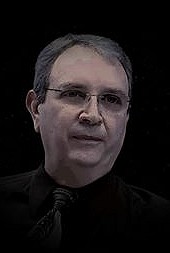Home > Reel Life (Movie section) > Reel Life Archive
Autumn 2015
Structure, structure, structure
Writing the Satisfying Film
A few months ago, Melinda Snodgrass pointed out something so insightful that it has changed the way I look at modern movies -- and why I'm skipping many of them.
First the backstory. I was trained to write by a guy named Irwin R. Blacker. He only had one lecture. It went like this: "Structure, structure, structure." I got the only A he ever gave out.
Now ... in the golden days of moviemaking, when you had well-trained guys crafting scripts, the stories were carefully constructed so that characters were motivated, events were logical, and stories had a specific inevitability from beginning to satisfying end. You got closure. Moviemaking was not just an art, it was a specific craft. Good writing was the foundation on which great movies were made.
Think about some of the classic films of the past, The Bridge Over The River Kwai, The Godfather, Invasion Of The Body Snatchers (1956), Them, Singin' In The Rain, The Searchers, The Maltese Falcon, Casablanca, It Happened One Night, and so on. Every incident, every beat, every motivational unit was there for a specific reason -- to move the characters forward.
Then in 1975, we got Jaws -- a well-crafted script that became a summer blockbuster. In 1977, we got Star Wars -- a well-crafted script that became a summer blockbuster. And from that moment on, the studios were enamored of the idea of having a blockbuster every summer. (The year The Abyss came out was an incredible year with a new blockbuster every weekend, until The Abyss arrived and the audiences were exhausted.)
But something else happened -- the growth of special effects. And the studios began to believe that blockbusters were about effects. Not story.
Oops.
Because now, we are in the post-plot era.
This is what Melinda pointed out -- that current moviemakers, she named names, I won't, are moment-oriented. Or in the lingo of stunt men, gag-oriented. Let's do this moment, this moment, this moment, and that. Then we'll have the writer link them all together. So there isn't any character development. It's all about moving the protagonists from one effect scene to the next. Cloverfield. Super 8. Godzilla. Any of The Transformer movies. Star Trek. Episodes 1, 2, & 3.
And I think we're nearing the end of that cycle. The studios do cycles. After The Poseidon Adventure, there was a swarm of disaster movies -- including The Swarm, which killed the cycle. After The Sound Of Music, there was a gaggle of big budget musicals, most of which flopped. We are now well into the Comic Book cycle and the Big FX film masquerading as science fiction cycle.
While I don't believe the audiences are going to stop going to the Marvel films, and I do think that audiences are becoming jaded and skeptical about all big-budget effects films -- especially if there's no logical story to justify the effects. I have not seen Jupiter Ascending, but I'm told it has no story.
Over here, I'm a curmudgeon. Maybe my writing will be remembered a thousand years hence, more likely probably not. But if it does survive, it will probably be something that gets inflicted on bored high school students who -- if I have touched a nerve will find something meaningful, or if I have not, will wonder why anyone ever thought this work was worth saving and sharing.
But because I do care about something more than the paycheck, because I do care about the quality of the work, I stop to consider every sentence. I spent a half hour today thinking about what one character would say to another when he entered the room. Then, when I added something else to the scene, something else more appropriate popped into my head. That's how writing works. You keep trying on possibilities until you find the one that has a solidity to it.
That is, if you really care about what you're doing. Based on the evidence, there are guys who are more interested in mechanics than character.
That's not me. I'm not only a curmudgeon, I'm old-fashioned. I want to write stories that have the same sense of wonder that attracted me to Galaxy and If and Analog and F&SF in the first place. Heinlein and Sturgeon and Clarke and Bester are no longer here to write the stories I want to read, so I have to write them myself -- and hope to evoke that same sense of wonder all over again.
In that, I'm part of a process -- someday there may be some young punk who will be saying, "I want to write stories like that old fart used to do." Maybe I'll be that old fart, maybe it'll be someone else. But the real job of the science fiction writer is to keep pushing at the boundaries of the known universe. I'll push it as far as I can, and whoever comes next will push it as far as he or she can and then pass the torch to the next generation.
But if any of our efforts are going to be worth reading -- or watching -- then it's up to us to make sure that we part our heart and soul into making them worth that effort.
Anything else is fraudulent -- promising something, taking the money, and not delivering.
March, 2015

David Gerrold is a American-based writer of short and long fiction and scripts.
Interview with David Gerrold;
David Gerrold: Me and Science Fiction;
Gerrold answers The Usual Questions (interview);
Movie Review, The Martian Child;
David Gerrold film/tv listing (IMDB)
Author's web site
David Gerrold on Facebook
For posts about Melbourne events, places, news, reviews, giveaways, see our Facebook Page:







 Published in Melbourne, Victoria, Australia
Published in Melbourne, Victoria, Australia